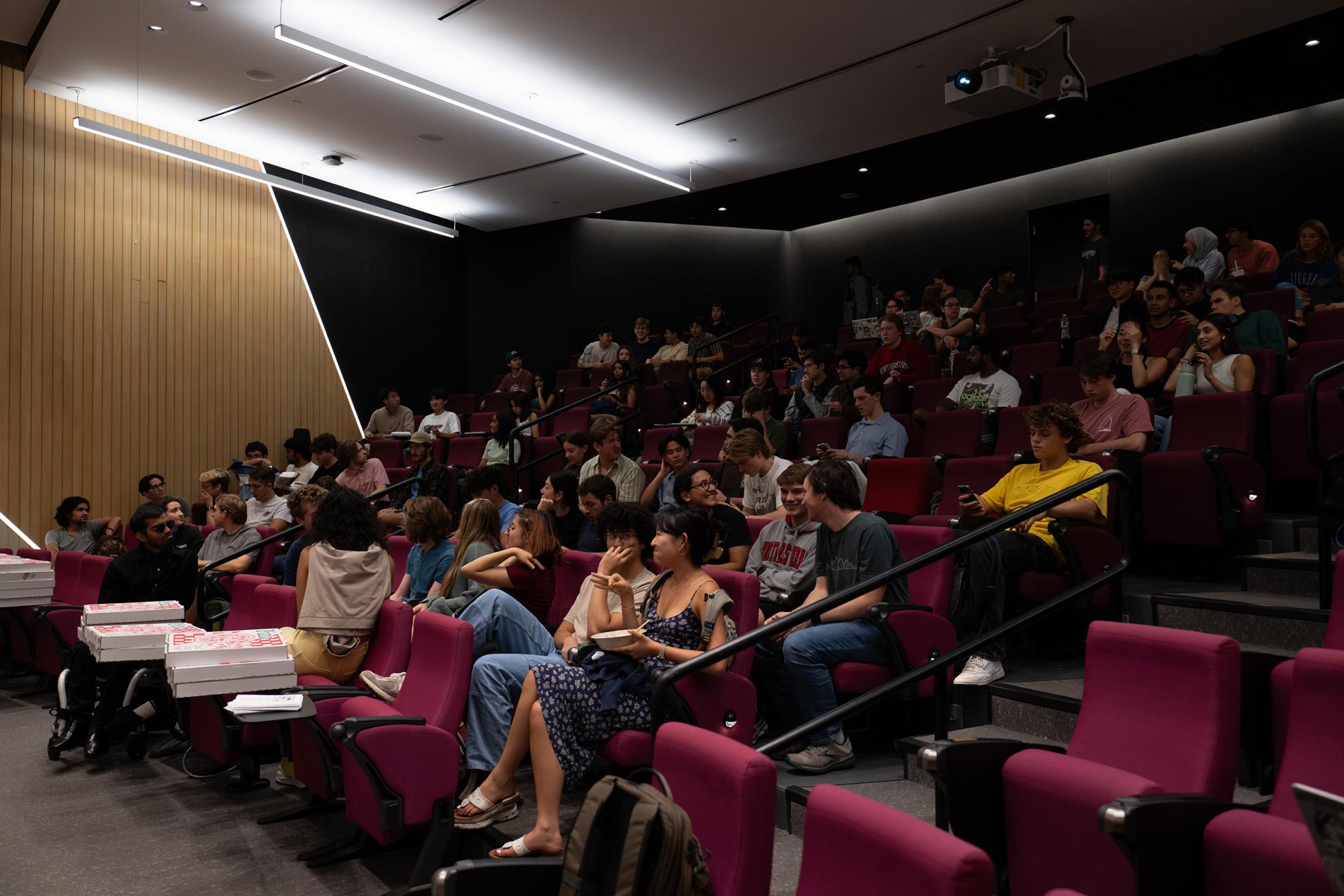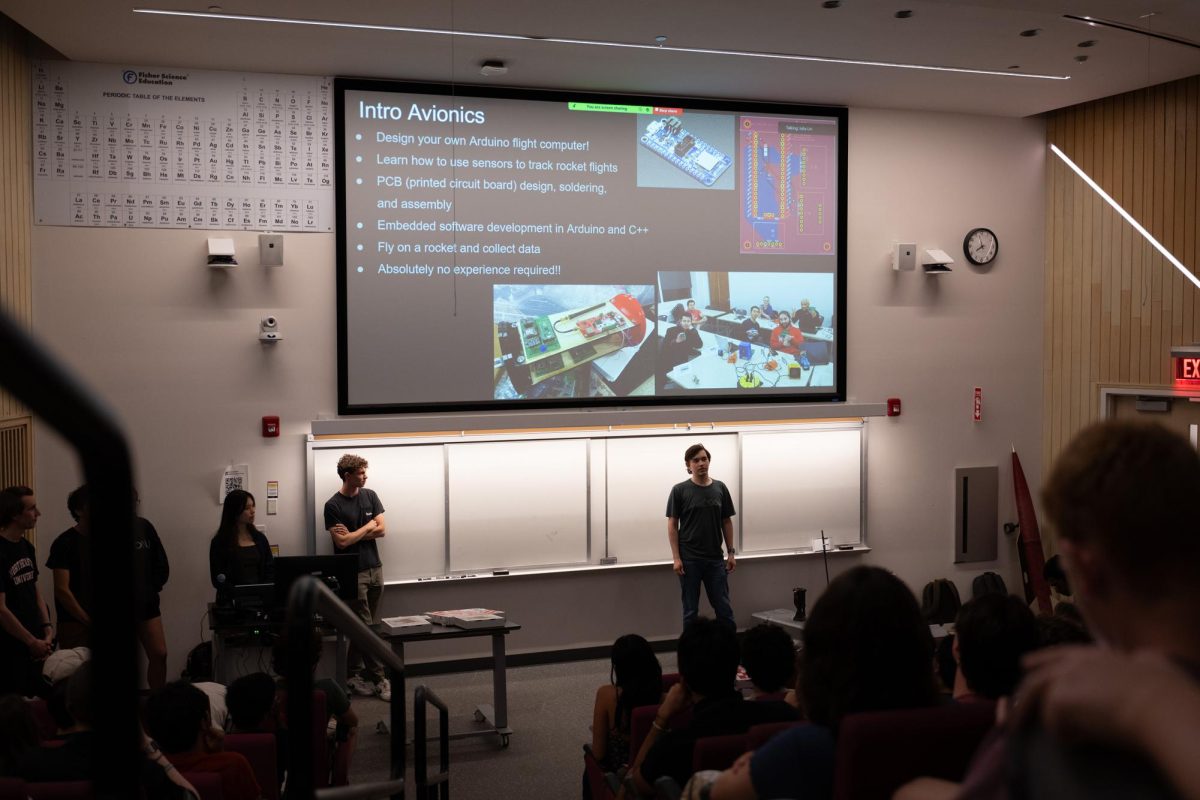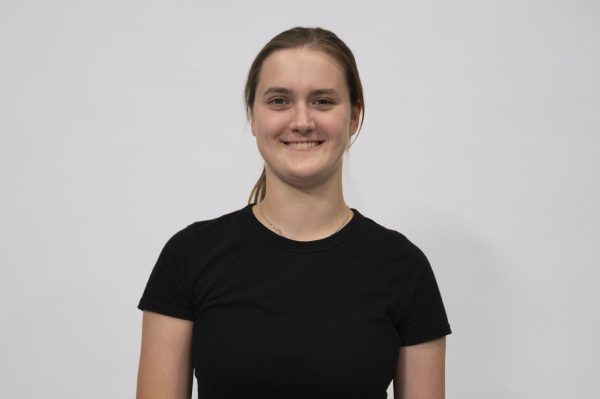In February, AerospaceNU members braced the frigid New England winter and bundled up to launch two rockets in Saint Albans City, Vermont. That day, the Teapot, a 78-inch dual deployment rocket, and the Rubber Ducky, a 96-inch bright yellow Bulkhead innovations rocket, both successfully took to the skies. On the AerospaceNU Instagram, students were pictured making last adjustments in an open field.
Watching the successful take-off of a “homemade” projectile isn’t unusual for members of AerospaceNU, or AeroNU, Northeastern’s most prominent aerospace engineering club. The group aims to push the “boundaries of collegiate aerospace development” by building a range of aerodynamic objects including rockets, remote controlled planes, liquid rocket engines and drones, according to the club’s website.
“Technical clubs like [AeroNU] are the only way to gain [the engineering skills you need] before going on co-op,” said Sam Benenson, a fourth-year mechanical engineering major, also adding that AeroNU helps bridge the gap between the theories students learn in academic engineering classes and the hands-on experience needed to successfully execute aerospace projects.
Originally founded in 2012, the club is designed to give students hands-on engineering experience outside of classes. Driven by the motto “If it flies, we’re on it,” AeroNU runs on the passion of more than 100 club members who are eager to explore all aspects of aerospace engineering and share their findings with other students, the club’s website explains.
The club is divided into five major projects, each dedicated to building a different aerodynamic object based on members’ skills and interests. The first is the Northeastern University Launch Initiative, or NULI, which builds rockets to compete in NASA’s University Student Launch Initiative.
Students on the NULI team build, test and launch a rocket that meets the requirements of a specific challenge created by NASA. Within the rocketry team in AeroNU is the propulsions team, which builds a liquid rocket engine to compete in the Friends of Amateur Rocketry competition.
Julia Lin, a fourth-year mechanical engineering and physics combined major who serves as president of AeroNU, said community is a big aspect of the club. Most of the friends Lin made her freshman year are still part of the club today as e-board members and project leads.
“I push the limits of my knowledge and expertise coming to [AeroNU],” said Jacob Magill, a third-year mechanical engineering major and co-lead on the propulsions team.
Another project the club works on is titled Northeastern Unmanned Aerial Vehicles, or NUAV. They build drones for racing as well as research and development within the club. The projects give students the opportunity to build, program and test drones. Members meet in Dedham to fly the drones and participate in the University Rover Challenge, one of the world’s top collegiate robotics competitions, with the Northeastern University Mars Rover Team in Utah.
“I attribute a lot of my success in drones to having joined that club and to having had wonderful mentors who have shaped me into becoming a mentor for new students,” said Pedro Caceres, a Plus-One program mechanical engineering major.
FixedWing is AeroNU’s remote-controlled plane project. Vanessa Khangi, a fourth-year mechanical engineering student and one of the mechanical leads on the project, explained the current goal of the project is to build small and stable remote-controlled planes manufactured with materials easily accessible to college students. It is important that the plane’s projects are repeatable, she said, so the team has multiple planes available for testing and flying lessons.
“Getting hands-on experiences and learning to work on a team towards a shared goal has been the best part [of being on FixedWing],” Khangi said, who is now completing her second engineering co-op.
AeroNU’s Project Horizon, otherwise known as CubeSAT, develops satellites through NASA’s CubeSAT Launch Initiative, a program that provides cost-effect ways to build satellites, allowing educational institutions to get practical experience in designing, developing and building flight hardware.
The team is currently working on a project called Pleiades Atlas, a satellite built in partnership with California State Polytechnic University, Pomona’s Bronco Space program. Northeastern is one of five other U.S. universities involved in the project and plans to launch their satellite in 2025.
Brian Hulbert, a fourth-year biology and philosophy double major and the project lead on Project Horizon, says his favorite part of working on the project “is being able to collaborate with other university students who are passionate about space and pushing the limits of what a university can handle.”
Although each project is working towards big goals, club leaders and members say the organization is geared towards students with no prior experience. Introduction to Aerospace is the fifth project run by AeroNU. It is designed to teach new students everything they need to know to participate and grow in the club.
“I had never done anything related to rocketry or aerospace. The upperclassmen taught me everything I [needed] to know,” said Tulasi Holdridge, a fifth-year computer science major.
According to AeroNU’s website, the program is structured like a class, with an emphasis on practical application of topics. New students are paired with veteran members and work through a project from start to finish.
“[AeroNU] was one of the main reasons I was hired for my co-op,” said Julia Rice, a third-year mechanical engineering major. Rice, who joined the club as an undeclared engineering major with little aerospace experience, was mentored by upperclassmen through how to build a rocket and eventually given a leadership position on a rocket project. Today, she is the project lead of the NULI team.
“My boss thought it was so cool that I had built a rocket,” Rice said.
In addition to the technical work done at AeroNU, community plays a key role in the club’s culture. Salmaan Shafqat, a fourth-year mechanical engineering major and co-lead of the liquid rocket engine team, said there is a place for everyone in AeroNU because there are so many opportunities to explore individual interests.
“You will find a home here,” Shafqat said.

The Huntington News is dedicated to serving the Northeastern University community with original, professional reporting and creating an environment in which student journalists can learn from one another. Support an independent, free press at Northeastern University with your donation today.












